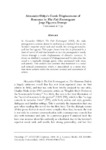Alexander Oldys’s Comic Displacement of Romance in The Fair Extravagant

Ver/Abrir
Use este enlace para citar
http://hdl.handle.net/2183/17057Colecciones
Metadatos
Mostrar el registro completo del ítemTítulo
Alexander Oldys’s Comic Displacement of Romance in The Fair ExtravagantAutor(es)
Fecha
2008Cita bibliográfica
AEDEAN 2008, 31: 433-440 ISBN-978-84-9749-278-2
Resumen
[Abstract] In Alexander Oldys’s The Fair Extravagant (1682), the male protagonist is anxious about his authority as a husband due to the heroine’s superior social rank and wealth, her strong personality, and her free agency. This paper shows how this is presented in a kind of novel of trial that intends to test the protagonist’s manly virtues through a comic displacement of chivalric romance. It draws on Bakhtin’s concept of Prüfungsroman and his idea that the novel is a markedly dialogic genre, often permeated with irony and parody. This analysis also assumes that manhood is a social and cultural construction which is materialised in a status that men must achieve under the constant scrutiny and assessment of others.
ISBN
978-84-9749-278-2





